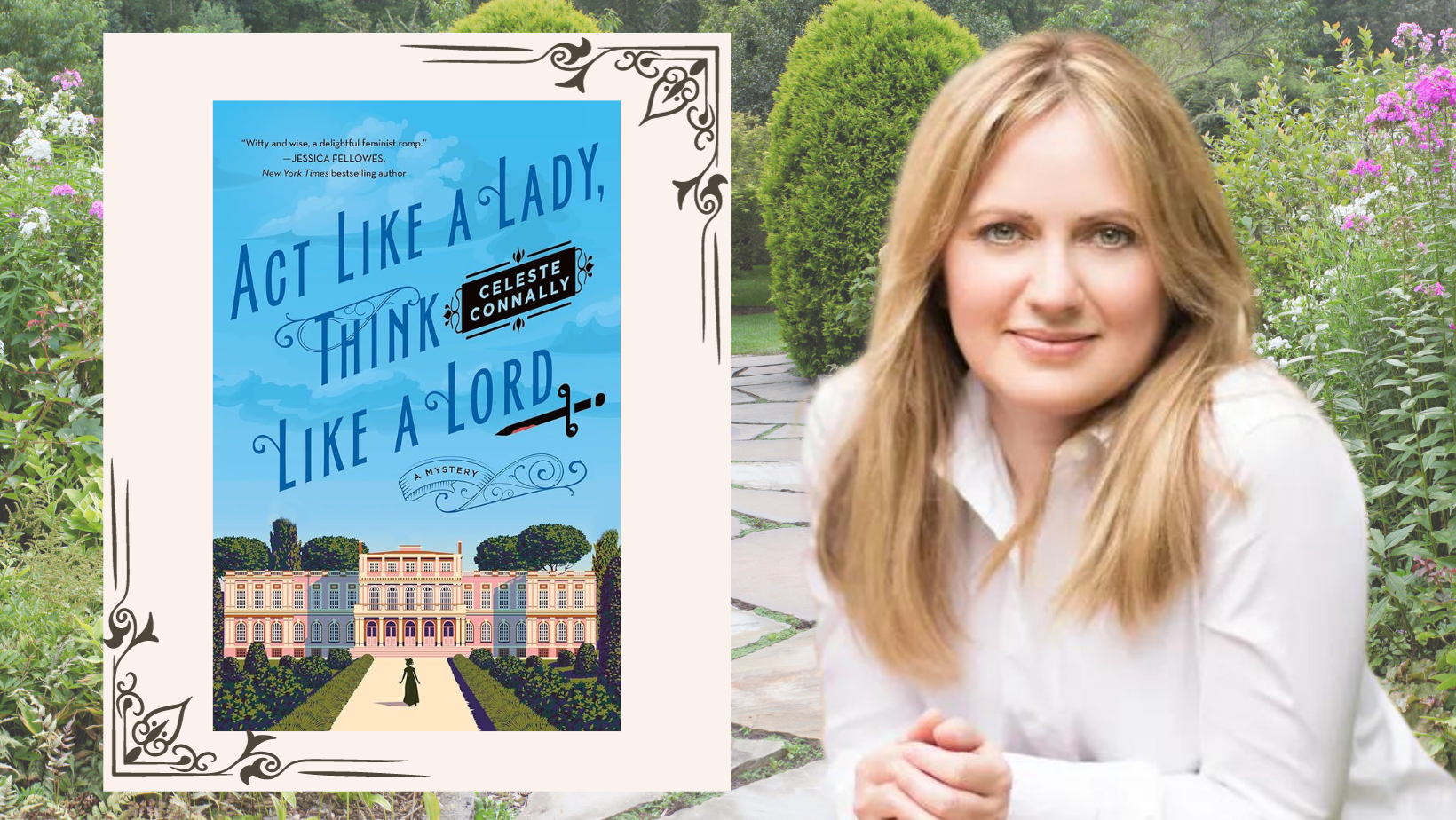
Celeste Connally’s debut historical Act Like a Lady, Think Like a Lord is an entertaining, hard to stop reading mash-up of romance, adventure, a big swoony ball, and a socially sensitive mystery. She introduces a fierce new character, Lady Petra Forsyth, who has just announced to society at large that she plans to remain unmarried. She’s greeted with derision and disbelief, and she handles it all beautifully. This is a wonderful series kickoff.
Robin Agnew for Mystery Scene: You’ve made a switch from cozy to historical mystery—what brought that on?
Celeste Connally: I’m a huge fan of historical fiction. The first books I ever read and loved were set in the past, and I grew up watching period dramas and classic movies, so it was a very natural transition for me. Plus, my cozy mysteries (which I adored writing, and haven’t given up the idea of writing more) were all about the past, with my main character being a genealogist. I all but set myself up for writing historical mysteries with that series! Also, the idea for Act Like a Lady, Think Like a Lord came when I was bingeing period dramas during the pandemic, so I do have to give credit to my comfort shows for sending me down a path I’ve long felt was part of my writing destiny.
How did you balance the character of Lady Petra to make her seem of her time, while also a strong and appealing for a contemporary reader?
The lovely thing was, I didn’t have to balance all that much after I learned through my research how often women in the Regency really did flout the rules. How so many were more relatable to us as modern-day women then you would think.
One example is Jane Austen herself. If you read her letters, there are parts where she sounds so amazingly of our times that you almost have to remind yourself that she was born in 1775 and passed away in 1817, before the Regency era (1811–1820) even concluded.
All the same, I wrote Petra as I saw her—clever and resilient and upbeat and curious and headstrong—but I kept a check on her actions to make certain she would remain the properly brought-up lady of her times. I also felt like Petra enjoyed all the trappings of her femininity, and her place in society in general, but that she had a rebellious, tomboyish side to her, as well as a desire to do what was right over what might have been easy. The combination of all that made the balancing act a fairly smooth one.
How common was it in 1815 for a woman to have her own fortune? And then, if she married, it all went to her husband, correct?
This answer could get very long, so I’m going to keep it to general terms. It was actually quite realistic for me to write Lady Petra as having money of her own that she inherited. Oftentimes, a woman’s money did come from having her father grant her a dowry during the marriage negotiations and contracts, but women could and did inherit money as well. However, no matter where her money came from, if a woman married, her monies, her possessions, and any children she would later bear became her husband’s from the moment they married due to the English law known as coverture. There might be provisions in her marriage contract that stated that her husband could not touch the principle of her dowry monies, but unless the daughter came from a powerful family who they could ensure their daughter’s monies would be kept safe, there was very little to prevent the husband from taking as much (or all) that he liked, if he were so inclined. (Which not all were, of course!)
I liked the combination in this book of romance, adventure, and some more serious social commentary. Kind of a Deanna Raybourn-Anne Perry mash-up. Can you talk a bit about the tone of the book and what kinds of things were important to you as you were writing Petra’s story?
It makes me very happy that you saw in my book what I wanted readers to see and feel. I’m honored by both comparisons, but I especially love Deanna Raybourn’s Veronica Speedwell mysteries. Her writing is brilliant, so the comparison makes me feel (to be very on-brand) a bit swoony!
This is my fourth published mystery, and I’ve found that I particularly love writing two things: action scenes and banter (especially romantic banter). Also, a wonderful bookseller coined my earlier cozy mysteries as “light thrillers,” and I felt that suited me and my writing very well. Yet, while I like my books to have a lighter tone, some humor, and definitely some romance, I really like writing in a few taut scenes, as well as depth. I want my main character to be relatable in her flaws and to be open to learning and growing as a person. With Lady Petra, that means that her sheltered existence and gentle upbringing will be challenged when she goes against social norms, and when her eyes are truly opened to the issues and lack of rights faced by her fellow women.
There are now several excellent series set around this time. What makes yours stand out and what calls to you about the Regency period?
I agree that there are excellent series set during the Regency era, no doubt. I’d like to believe it’s the faster pace of my story combined with the unique situation of my main character of Lady Petra that sets mine apart. At least, that’s what I love about it!
As for the Regency, it’s been a love of mine since I was very young, thanks to my wonderful mother introducing me to PBS literally from the day I was born, and the fantastic period dramas it aired. And of course, because of Jane Austen, whose novels made many of those future historical dramas possible. Also, I loved the fashion, and despite the very strict social rules of the Regency, it was actually a slightly freer time period in relation to the later, more austere, Victorian era. Of the pre-20th-century eras, the Regency is my favorite, and therefore setting my book during that period was simply a given.
There were several interesting characters whom I’m hoping will be carried through a series. One that really intrigued me was the female herbalist-pharmacist. Can you talk about developing her character a bit?
The character of Frances Bardwell, daughter of Sir Bartie, the apothecarist to the Royal Family, emerged almost out of nowhere, and I’ve been intrigued by her ever since. I decided on a whim that her mother (Sir Bartie’s second wife) is from Spain with Moorish roots, and that naturally lent a bit of something extra fascinating in Frances that you don’t often see in Regency characters. Beyond inheriting her father’s talents for herbalism and apothecary arts, she’s serious, introspective, watchful, and loyal, and I feel like she does a good job of rounding out the foursome that is Petra’s newfound band of girlfriends. I have fun things in store for Frances, and I hope to get to see them play out!
I thought you really captured what must have almost been the chaos of a huge ball like the one that opens the story. Can you talk about your research on this aspect of Regency life?
I went down a warren of rabbit holes in researching Regency balls, and I loved every second of it. From the fact that balls were almost always held around the full moon so that carriages had as much light as possible by which to travel, to the guests that could number from a few dozen to well over four hundred, to the song that opened the ball (usually a minuet), it was all interesting to me. One of my favorite facts was that the festivities didn’t end until after breakfast the next morning, well after a supper that happened around one o’clock in the morning. And at that supper, the hostess always served white soup, which is a creamy soup made from veal, rice, cream, and finely ground almonds. Also, those who were partners for the “supper dance,” which was the dance directly before the meal was served, usually walked into the dining room together, but there was not generally a formal seating arrangement otherwise. Clearly I found it all fascinating and would have made the ball scenes twice as long if I could because there were so many fun details to write!
I once heard Laurie King say at a conference that when you write a book about the past you are really writing about the present. I’m not sure how you could keep that out of a book, it seems unavoidable, but can you talk about some of the real kind of social issues you write about in this book and how they might connect to the present?
I’d have to agree with Laurie, and I think the reason why writing about the past is really writing about the present, in my opinion, is because of the old adage that as much as things change, they stay the same.
Still, my adding in social commentary actually came as a bit of a surprise. Somewhat because I’m a pantser and I rarely know exactly what I’m going to write before I do, but also because, while I do try to have depth in my books, I didn’t specifically set out to make a statement. It came out naturally as an extension of what Petra was feeling and going through as she navigated—without giving away too much of the plot—both the mystery of her missing friend combined with the judgment, censure, and even ill will that surrounded her decision to remain unmarried. In my opinion, much, if not all, of what Petra feels remains very true to this day when it comes to women, our rights, and how we are perceived and respected in society. And I did my best to have Petra express herself with passion, objectivity, and a measure of eloquence.
And how does a girl from Texas make her way to Regency England? Who are your literary and historical influences?
I’m a Texas girl with a mostly British ancestry, and I’ve been an Anglophile since my earliest days. Some of the earliest books I read were from British authors, and just some I could count as favorites and influences include Jane Austen, Agatha Christie, Dick Francis, James Herriot, Martha Grimes, and Jacqueline Winspear. In fact, when I was writing my very first book and many years from being published, I paid a talented editor to review my manuscript. One of her comments was that the dialogue of my modern-day main character sounded a bit formal and that it was “okay to use contractions.” I remember how much I laughed at myself for this, and thought that if anything indicated I should write a historical novel at some point, her comments were a sign! So, while I don’t plan to limit myself as to genre or time period, I really feel as if it’s my destiny to write historical fiction.
Finally, what might be next for Petra in what, I hope, will be a long series?
I, too, have my fingers crossed that it will be a long series! I would love that so much. For now, the second book in the series, titled All’s Fair in Love and Treachery will be out next year (exact date to be determined), and I’m very excited about it. It’s set during the real-life three days of citywide celebrations that took place in London after word reached the city that Napoleon had been defeated at the Battle of Waterloo. It was so much fun to write, and I hope that will show through!
Celeste Connally is an Agatha Award nominee, and a former freelance writer and editor. A lifelong devotee of historical novels and adaptations fueled by her passion for history—plus weekly doses of PBS Masterpiece—Celeste loves reading and writing about women from the past who didn’t always do as they were told.
Robin Agnew is a longtime Mystery Scene contributor and was the owner of Aunt Agatha's bookstore in Ann Arbor, Michigan, for 26 years. No longer a brick and mortar store, Aunt Agatha has an extensive used book collection is available at abebooks.com and the site auntagathas.com is home to more of Robin's writing.

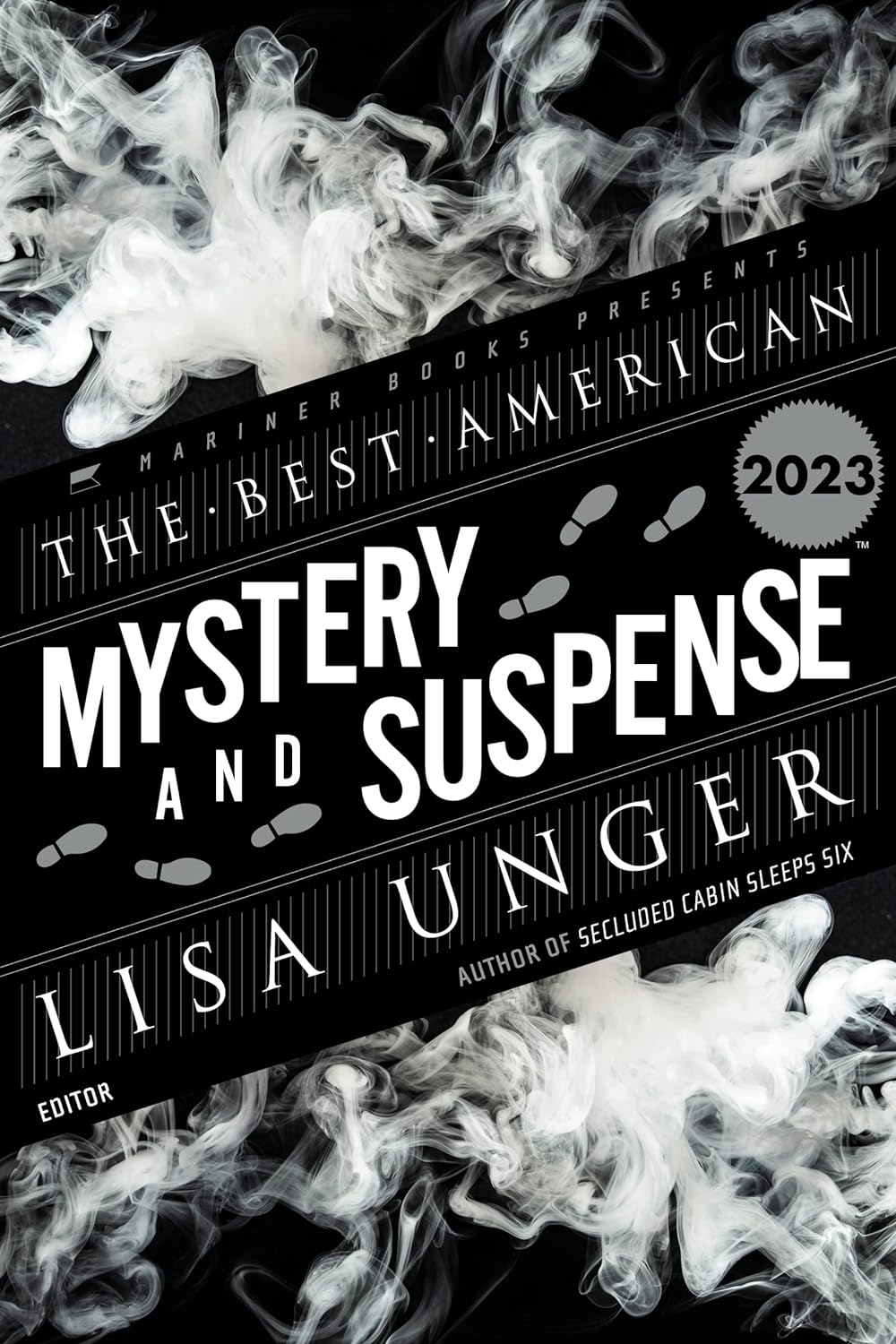
 Ben Boulden is the author of Western novels Blaze! Red Rock Rampage and Blaze! Spanish Gold, as well as the novella Merrick. He writes the column “Short & Sweet: Short Stories Considered” for Mystery Scene Magazine and has written more than 300 reviews, articles, and essays. He blogs haphazardly at
Ben Boulden is the author of Western novels Blaze! Red Rock Rampage and Blaze! Spanish Gold, as well as the novella Merrick. He writes the column “Short & Sweet: Short Stories Considered” for Mystery Scene Magazine and has written more than 300 reviews, articles, and essays. He blogs haphazardly at 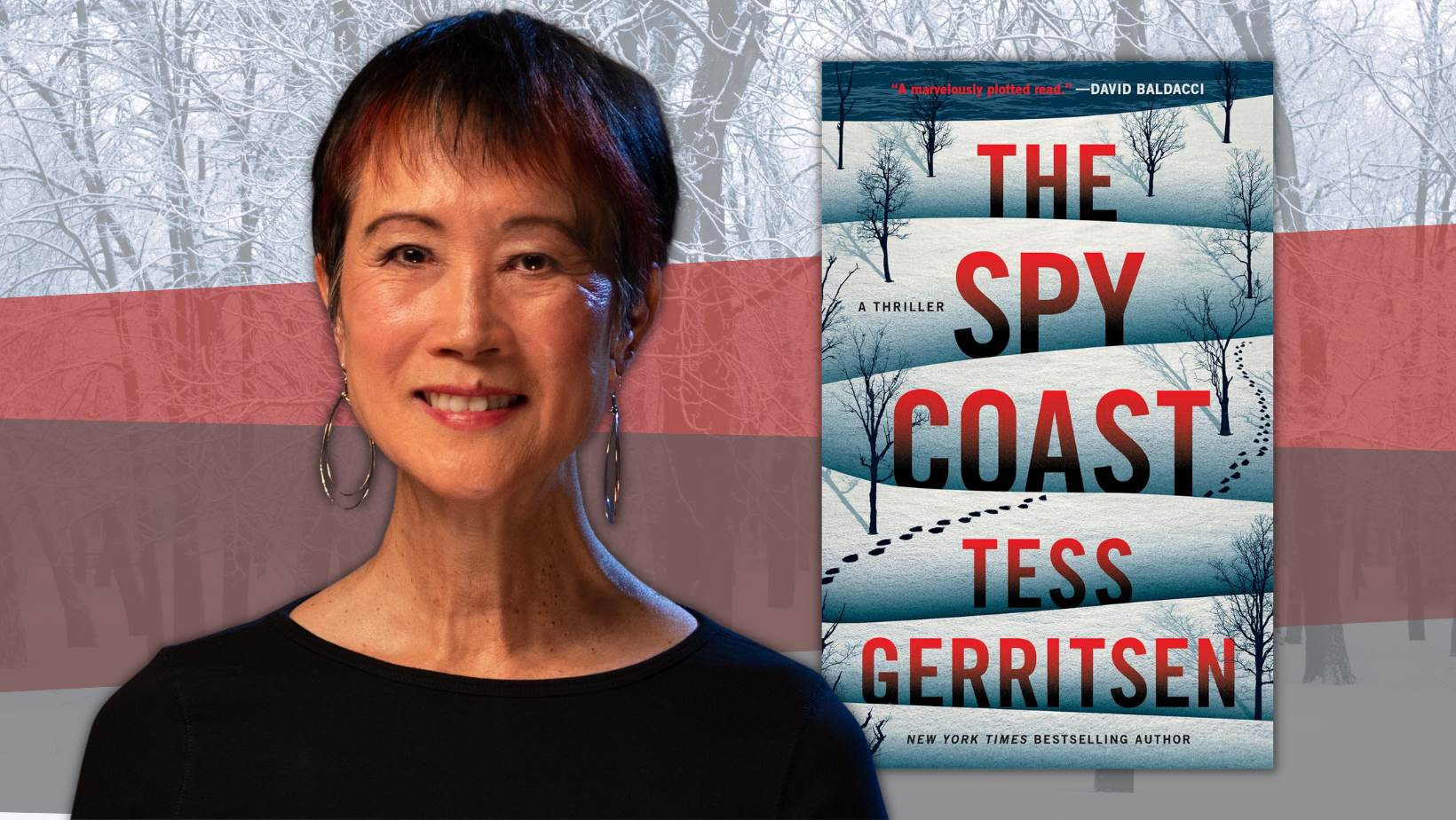
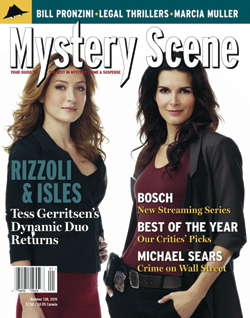
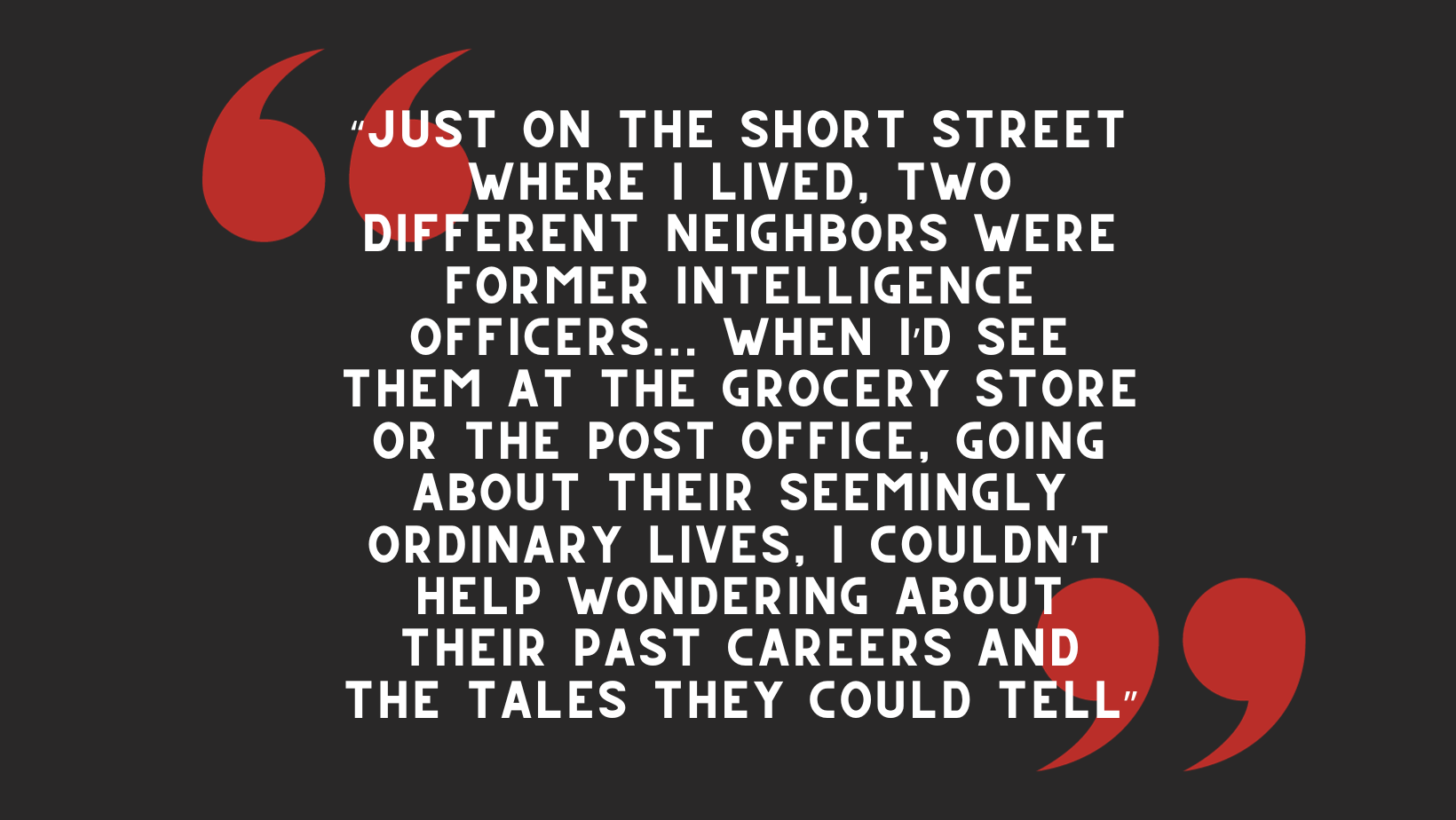
 John B.
John B. 
